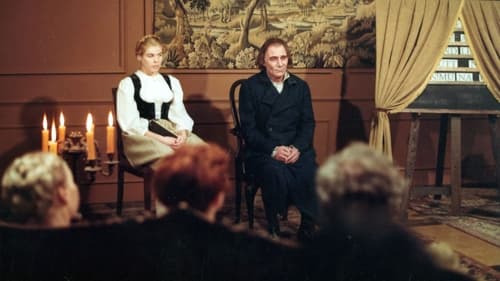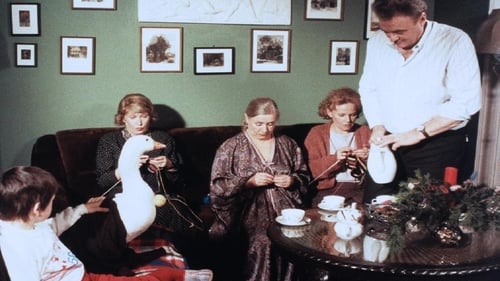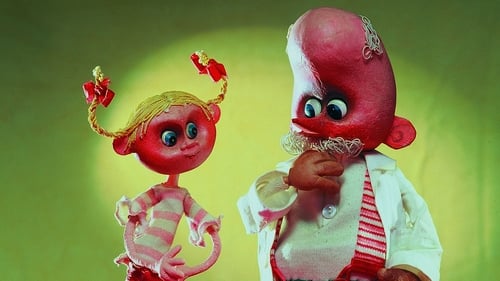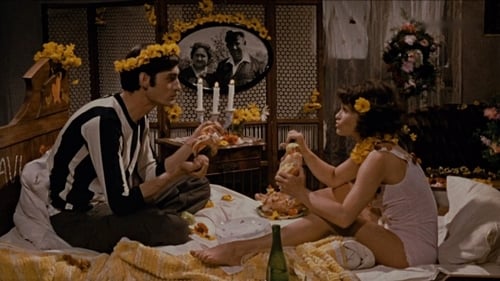Käthe Reichel
Birth : 1926-03-03, Berlin, Germany
Death : 2012-10-19

Großmutter
Once upon a time very much alike the twenties in Germany, a little town is frightened to death by an uncaught child murderer. Since somebody has to be blamed the townspeople turn against an inconspicious policeman, a family-man who becomes suspected of the crime and therefore loses his job. Strangely enough, the only work he can find is to distribute candy on children, dressed up as clown. When a bunch of kiddies, including his own son who doesn't recognize the father due to the masquerade, plays a nasty trick to him, things turn really ugly...

Frau Brigitte

Frau Lörke
He could have had women, he could have climbed the ladder of his accountancy career, and he could have stood on the podium next to the highest in the land. If only he had wanted to! But Farssmann, shaken by divorce and unwilling to better himself, wants to remain what he is: an ordinary bookkeeper like you and me. And so the dollar deal with Mr. Osbar from Utah (USA) is not the first time he comes into conflict with the very palpable unreality of a country called the German Democratic Republic.

Käthe Lindner

Alte Köchin
In the 1770s, Swiss farmer Johann Heinrich Pestalozzi established a school for poor orphaned children in the Aargau. Up to total exhaustion he sacrificed himself for his pedagogical theories. Five years later, the project of the idealistic educator failed after bloody attacks of the French. In retrospect, the disappointed Pestalozzi experiences the last few months with "his" children.

Gertrud Löwenhaupt

Frau Martin
In a small town, everyone has tried to forget what happened shortly after WWII. That is, until a stranger finds a book that Jadup (Kurt Böwe) gave to the young refugee Boel (Katrin Knappe), who resettled in the town over 30 years ago. Painful memories about Boel and the post-war period begin to surface and shake up the whole town. Boel vanished back then and nobody knew why. Word spread about a rape and some tried to blame a Russian soldier. Jadup, the town's respected and popular mayor, remembers, though, how he mistrusted Boel and did not help her through this difficult time; HE didn't even notice THAT Boel loved him. Jadup's confrontation with the past gives him a new, critical view of his current situation and surroundings.

schreiendes Bauernweib
German-Polish adaptation of Theodor Storm's novella.

Johanna van Gogh

Shortly after the end of World War II, young carpenter Achim is sent to a remote farm to do some repair work. Three women from different generations administer the farm on their own: Daughter, mother, and grandmother. There are no men around since grandmother Hanna has lost her husband in World War I, and mother Gertrud’s husband died in World War II. Although daughter Heidi is old enough to marry, she is neither engaged nor married. Thus, hardworking, yet shy Achim is the only man around.

Lydia Kowalenko is fired from the pharmaceutical company where she has worked for many years because she refused to help cover up the use of a dangerous chemical. Her daughter Katja, however, has no scruples and risks an operation which is more beneficial to her own medical research than to the convalescence of a young patient. Then Katja's only son dies after a car accident. Was he too the victim of a career-minded doctor?

Olli, the main character in the movie, got a very bad grade and is terribly annoyed. She runs away from home and, together with a dog and a horse, finds a (mad? nutty?) scientist in a windmill. They experience the strangest adventures in this windmill and find other interesting characters, a lot of excitement and peril. While you may well interpret something as the "socialist value system" into this movie, it is more meant to be a children's movie, showing the kids that there are more exciting things out there than the ones that your parents and teachers show you, and that you will only find out most of those things on your own, if you show enough curiosity.

Mutter Kriepsch
World War II is over and Heinrich, a young German boy, influenced by the Russians, starts to act according to Communist principles in a small German village.

Josepha
In a small village in West Prussia in the 1870s, Germans, Poles, Gypsies and Jews live together as neighbors. One night Johann, a German mill-owner, secretly opens the dam gates and floods the mill of his Jewish rival Levin. After his business is ruined and his calls for justice go unanswered, Levin leaves town.

Olser
The wrenching story of a woman sentenced in 1934 to ten years in prison for antifascist activities. The love between her and her fiancée enables her to survive the tribulations of her time in prison, where she is one of few political prisoners.

Juliette Kirch
Adaptation of Theodor Storm's novella "Hans and Heinz Kirch".

Frau Wolff
Karl Erp is a middle-aged man with two children and a boring marriage. After starting an exciting affair with his intern, Miss Broder, he leaves his loveless marriage and moves in with his lover. Under pressure from Miss Broder’s mother, Karl once again promises marriage. He finds, however, that the excitement that drew him to her in the first place doesn’t carry over into their daily lives.

Frau Polzin

Tussi

A group of children are trying to organize a pioneers detachment.

Tante
Europe in 1793. For years, England and France have been at war with each other. Now, France sends three men to the British colony of Jamaica to organize a slave revolt. The envoys are Debuisson, the grandson of a Jamaican rum manufacturer, who knows the island very well, his old friend Sasportas, and the sailor Galloudec. After having established contact with the fragmented rebel groups, they receive the surprising news of Napoleon′s takeover in France. Whereas Debuisson, who by now has gotten used to his role as a rich heir, wants to wait for new instructions from home, his companions are determined to press ahead with the revolt. When a slave kills a British guard, the situation escalates.

Ida
The five-part feature, based on the novel by Helmut Sakowski, focuses on the friendly but also rival relationship between Druskat and the self-righteous Max Stephan, an old pal with different attitudes towards life and socialism . Druskat came to Mecklenburg as a refugee after World War II, became an integral part of the community, but also repeatedly caused a stir. Since the death of his wife he lives only with his daughter Anja, although there were enough women who wanted to be with him. Now he´s chairman of the LPG, the "volutary" federation for agriculture and animal husbandry. One evening, two men from the public prosecutor's office come to pick him up. He seems prepared, but Anja doesn't know why. Her first way leads her to Max Stephan, LPG chairman in the neighboring village. She happened to be there during the last argument between them, Max threatened to literally destroy Daniel. Did he carry out this threat? In conversations with the villagers, she gradually learns the truth.


Europe, 1620: The well-known astronomer and mathematician Johannes Kepler, who teaches as a professor in Linz, receives the message that his mother is prosecuted as a witch in Württemberg. The truth behind the allegations is rather simple: His mother has been denunciated by a former friend after an argument with the authorities. Kepler tries desperately to convince the prosecutors of the absurdity of their allegations with rational arguments.

Frau des Schießbudenbesitzers
Paul and Paula have had bad experiences with love: Paul is financially well off but has lost all affection for his wife, and Paula leads a troublesome life raising two children on her own. They meet and discover a strong passion for each other. Life seems like a dream when they're together - but their short flights from the burdens of reality are once and again interrupted by Paul's ties to family and career.

Lucie „Goldlucie“ Matewsky
After meeting the woman on the train Erwin Retzmann kills her in the forest.

Frau Hintz
In his daydreams, 15-year old Otto is a real hero who masters dangerous situations by the dozen. But in reality, the rather imaginative ninth grader has trouble moving up to the next grade. Fortunately, his teacher Nickel notices that Otto does not lack intelligence, but the ability to use his imagination for the requirements of everyday school life. Together with school director Menschke, Nickel tries to change Otto’s attitude. Although this is easier said than done, Otto eventually realizes that he has to try to build his cloud-castles only after school has ended. And his teacher is going to support him in his attempts.

Lehrerin Meta Müller
When 17-year-old Angelika moves to Leipzig, she is forced to rent a room at Mrs. Häublein’s for a start, since her parents will not follow until a few months later. Fellow tenant Thomas, a philosophy student, is not at all enthused about his new, pretty housemate. Because of Angelika he has to move into a smaller room. Furthermore, he is annoyed at her many male acquaintances, without sensing that his aggression might be prompted by jealousy. When Angelika’s father comes for a visit, he asks Thomas to keep an eye on his daughter. Thomas takes this assignment very seriously and finally realizes that he has fallen in love with Angelika.

Karins Wirtin
19-year old Peter is working to gain practical experience for his planned medical studies. But his life turns into confusion as he unexpectedly comes a father.

When a motorcyclist dies in an accident, lieutenant Kreutzer and his colleague Arnold receive the order to investigate the backgrounds of this mysterious case. Although the leads point to murder, head physician Dr. Nikolai, the driver of the car involved in the accident, maintains his innocence and even has an alibi. With a lot of arduous detail work, Kreutzer follows all leads and evidence. Both Nikolai’s colleagues and his son act suspiciously. Eventually, Kreutzer convicts the criminal who secretly used the physician’s car for his criminal dealings.

Ulrike
A farmer receives land from the king and discovers a buried golden mortar. He decides to give it to the king out of gratitude, but his clever daughter warns him that the king will surely want him to bring a corresponding pestle as well. When the king throws the farmer into jail for fraud, he bemoans the fact that he did not listen to his daughter.

Grusche Vachnadze

Dr. Wagner is a scientist currently working on an experiment for the Asta plant in East Berlin. If the experiment is successful its a brilliant new invention. But Wagner is the target of sabotage, and all the decisive experiment fails. Wagner can not explain this setback.

Berlin in 1878: Corinna Schmidt, who was brought up in a petit-bourgeois, academic family, is romantically interested in Leopold Treibel, the son of the lordly councillor of commerce Jenny Treibel – although Corinna is also deeply in love with her cousin Marcel. Leopold is also falling for cute Corinna, and Jenny Treibel tries to prevent their friendship by all means, but changes her opinion when their secret engagement becomes public. To avoid a scandal, she urges them to marry quickly. But Corinna soon withdraws from this complicated situation and again turns to her cousin, who is banished from the country for his social democratic beliefs.






















